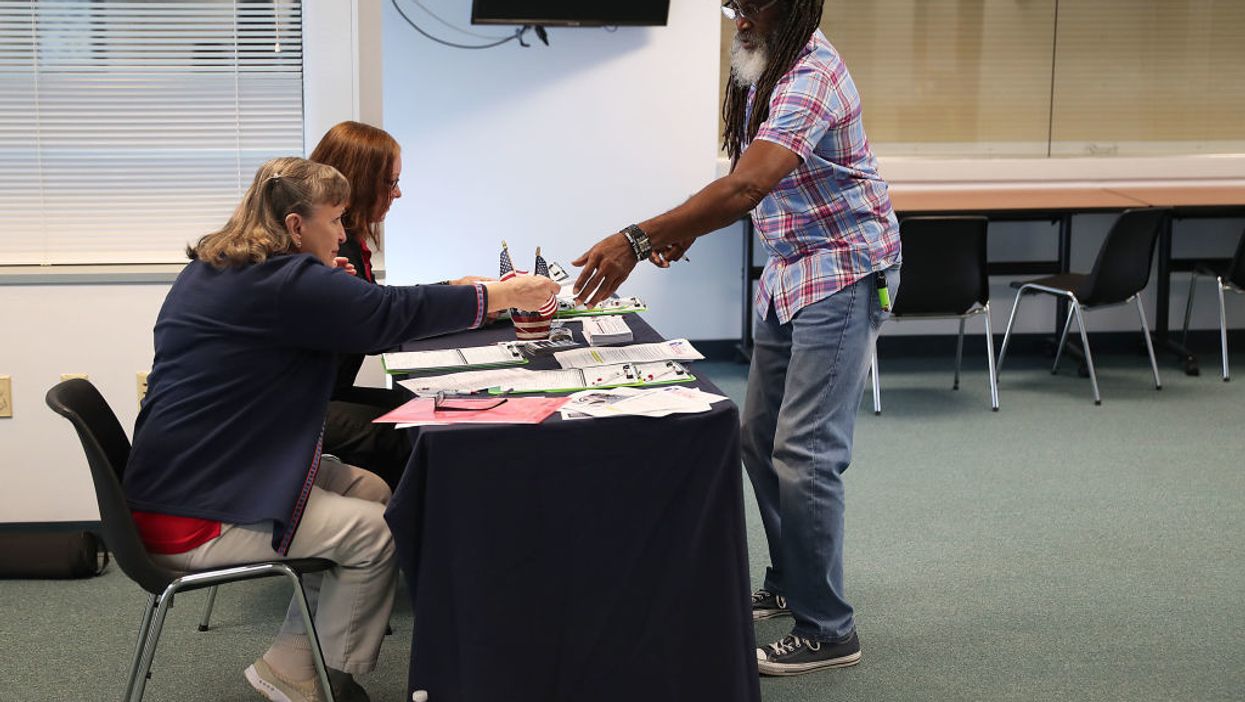The Supreme Court on Thursday blocked several hundred thousand Florida felons from exercising their new voting rights in next month's primary.
The decision was the first from the high court in one of the past decade's most important, impassioned and complicated stories about expanding democracy.
The justices refused to quickly intervene in an appeals court decision that is preventing felons released from prison from registering and voting until they pay all fines, court costs and restitution. The ruling certainly sidelines them from the August primary and perhaps also the general election, when their votes might prove dispositive in another of Florida's razor-close presidential contests.
The court's three most liberal justices — Sonia Sotomayor, Ruth Bader Ginsburg and Elena Kagan — dissented. Sotomayor, writing for the three, said that thousands of ex-felons are being blocked from voting in the primary "simply because they are poor."
"This court's inaction continues a trend of condoning disfranchisement," she wrote, deriding the rules at the center of the case as a "voter paywall."
The decision is the latest twist in a complex legal battle that goes back to the fall of 2018, when 65 percent of Florida voters decided to restore voting rights to almost all convicted felons who had completed their sentences, including probation and parole.
The following year, the GOP-majority Legislature passed and Republican Gov. Ron DeSantis signed a law requiring felons to pay all their court-ordered financial obligations before registering. It was based on the rationale that those payments constitute completion of a criminal sentence.
That law was then challenged and federal Judge Robert Hinkle struck it down in May — ruling the law created a "pay-to-vote" system that was akin to the poll taxes barred by constitutional amendment during the civil rights era.
The state appealed, and this month the 11th Circuit Court of Appeals granted a request from DeSantis to put the judge's decision on hold until the full court could hear arguments Aug. 18 — coincidentally or not, the same day as the primary.
"This is a deeply disappointing decision," said Paul Smith of the Campaign Legal Center, the voting rights advocacy group that asked the court to allow felons to vote right away.
An estimated 85,000 felons have registered during the period in the legal wrangling when that was allowed.
As many as 1.4 million ex-convicts were covered by the voters' decision, but about half of them appear to have some sort of financial obligations to the state — although how many of them and how much they owe, remains a mystery because of poor government record-keeping. That confusion is cited by voting rights groups as one of the reasons why the new law amounts to unconstitutional voter suppression.
But how many ultimately would register and vote is uncertain — and now will continue to be. The deadline for getting on the rolls in time for the primary is Monday.
Most states restore the franchise to felons after their sentences, along with time on parole or probation. About a dozen impose significantly restrictive additional requirements. Before the referendum, almost no felons in the state were ever allowed to cast a ballot again. It was one of the most restrictive rules in the country — so the statewide vote at the time amounted to one of the biggest single expansions of the franchise in modern American history.
States run by both parties have been moving steadily to expand the political rights of criminals who have done their time, agreeing with civil rights groups that such moves accelerate their return to productive roles in their communities. Many conservatives disagree, saying their debts to society should not be too easy to retire. They also concede, however, that the more felons vote the worse Republican candidates fare.
Since Florida's felon population, like that of almost all states, is disproportionately Black and Latino, a new burst of their votes would almost certainly propel Joe Biden to carrying the state's 29 electoral votes. President Trump won them last time by less than 1 point.
In several voting rights cases that have landed on its doorstep near election dates, the Supreme Court has declined to intervene — citing the precedent the court set 14 years ago, dubbed the Purcell principle: "Court orders affecting elections, especially conflicting orders, can themselves result in voter confusion and consequent incentive to remain away from the polls," the court ruled then. "As an election draws closer, that risk will increase."
The state of Florida argued that the trial judge's decision had run afoul of that principle.




















